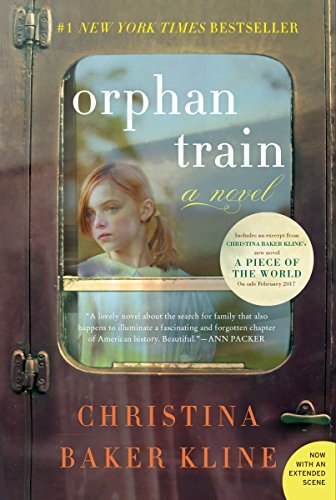Orphan Train
Orphan Train
By: Christina Baker Kline
My initial reflection on reading this book was anger and sadness. There's enough resources out there to know that immigrants and children in foster care are not always treated like human beings. It sickens me to think about the experiences families immigrating into the US or the children riding the orphan train had to endure. I can't fathom what kind of person you have to be to treat children like criminals when they've lost everything they have, or to treat people like scum just because they see the world through a different cultural lens.
I realize that this is not always the case and am hopeful that foster homes and programs for immigrants will get better and better to improve the lives of those at the mercy of the system. I think, if anything, this book is a reminder that everyone has a story that has brought them to where they are and we must get better at learning others' stories and see them in light of that, most specifically as human beings that matter just as much as ourselves.
My second reflection is mostly because of some of the other reviews I've read that criticize the 'stereotypes' portrayed in this book. When I hear 'stereotype' I try to ponder the context before becoming indignant because, honestly, stereotypes exist because they come from a place of truth. A lot of people held issue with the character of Dina, the conservative Christian stereotype. She was kind of a monster. If I had to choose a label, I guess I would fall under conservative Christian, but I need to make it known that whatever god Dina was worshiping, it was not the God of the Bible.
We should be wary to pass judgements on labels when people claim them who shouldn't. All Christians are sinful people. But the behavior and words that Dina used are not what God wants from us, not even in the least bit. There are plenty of people like Dina out there, so I don't think this stereotype is 'wrong' per se to write about, as long as we realize that followers of Christ should treat ALL people with respect and love and I wish people like Dina would either stop calling themselves Christians or would start trying to be one.
My thoughts on the book as a whole literary work. I was very intrigued by the premise- I always enjoy fiction rooted in historical events, so it was interesting to learn about the orphan train and places during the 30's. I really liked how the author connected the past with the present via the objects in her attic. We discovered some in the present before we knew their significance, which leads you to keep reading to find out how the keepsake played a role in Vivian's journey. The things we take with us from place to place really do tell a story and show us what we value and what has shaped us into who we are. I think that is a thought worth pondering and exploring which is what this book is truly about.
My final reflection is just a truth I want to share. The author plays with the idea of 'fate.' That the events in these characters' lives had to happen the way they did to find certain people or experience certain things in their lives to bring them to where they are. The intricate connections between one life and another. And this is a very important revelation- not because our lives are controlled by the fates- but because our lives are orchestrated by a loving Creator who desires to bring us to very specific places and meet very specific people because he has a plan for us and desires to draw us to Himself.
That is a pretty incredible reality! Whether we can see God's providence right now or not, we can be confident that God doesn't waste our pain, that he sees us, and he is orchestrating a great symphony that someday we will hear in full!

